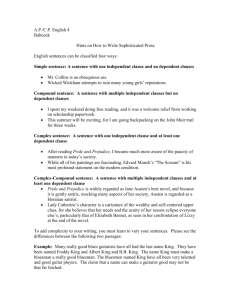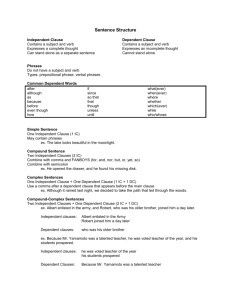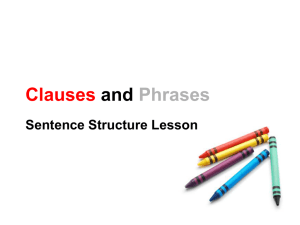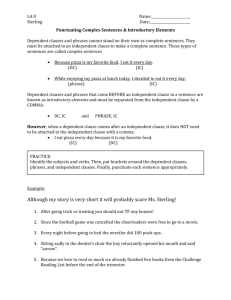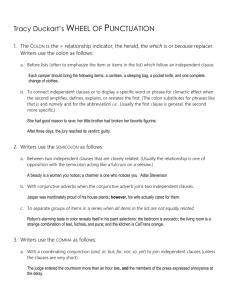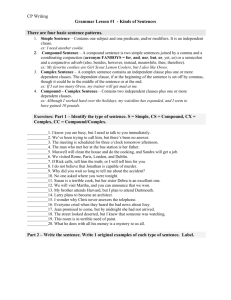USES OF THE SUBJUNCTIVE AND OPTATIVE, OR..
advertisement
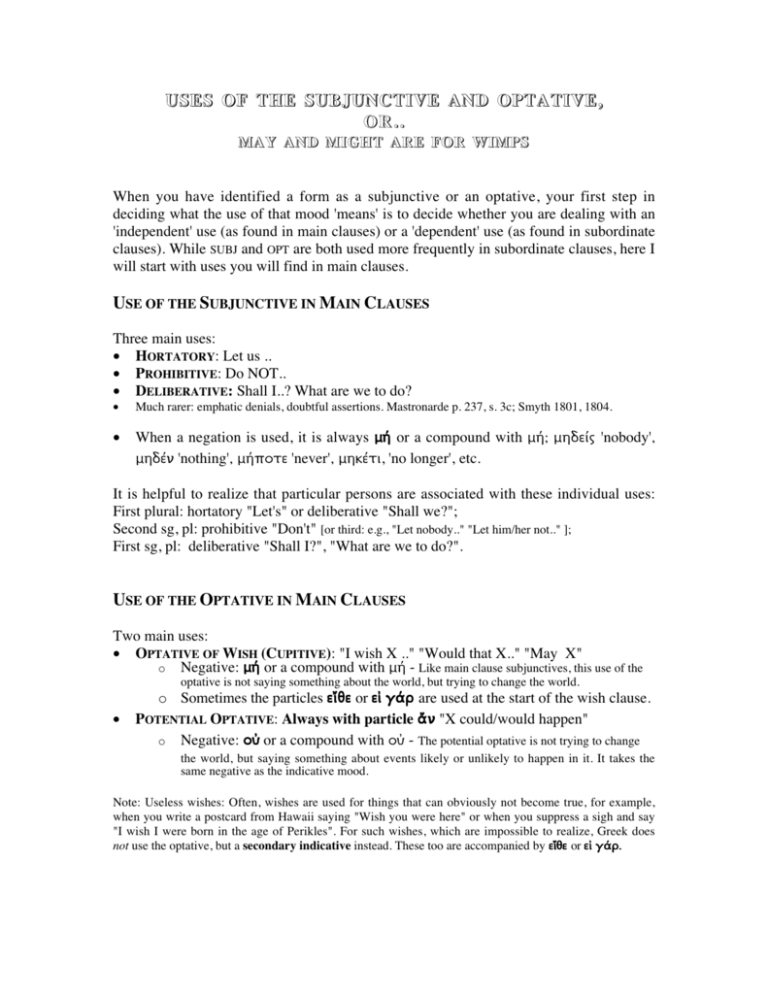
USES OF THE SUBJUNCTIVE AND OPTATIVE, OR.. MAY AND MIGHT ARE FOR WIMPS When you have identified a form as a subjunctive or an optative, your first step in deciding what the use of that mood 'means' is to decide whether you are dealing with an 'independent' use (as found in main clauses) or a 'dependent' use (as found in subordinate clauses). While SUBJ and OPT are both used more frequently in subordinate clauses, here I will start with uses you will find in main clauses. USE OF THE SUBJUNCTIVE IN MAIN CLAUSES Three main uses: • HORTATORY: Let us .. • PROHIBITIVE: Do NOT.. • DELIBERATIVE: Shall I..? What are we to do? • Much rarer: emphatic denials, doubtful assertions. Mastronarde p. 237, s. 3c; Smyth 1801, 1804. • When a negation is used, it is always mÆ or a compound with mÆ; mhde¤w 'nobody', mhd°n 'nothing', mÆpote 'never', mhk°ti, 'no longer', etc. It is helpful to realize that particular persons are associated with these individual uses: First plural: hortatory "Let's" or deliberative "Shall we?"; Second sg, pl: prohibitive "Don't" [or third: e.g., "Let nobody.." "Let him/her not.." ]; First sg, pl: deliberative "Shall I?", "What are we to do?". USE OF THE OPTATIVE IN MAIN CLAUSES Two main uses: • OPTATIVE OF WISH (CUPITIVE): "I wish X .." "Would that X.." "May X" o Negative: mÆ or a compound with mÆ - Like main clause subjunctives, this use of the optative is not saying something about the world, but trying to change the world. • o Sometimes the particles e‡ye or efi gãr are used at the start of the wish clause. POTENTIAL OPTATIVE: Always with particle ên "X could/would happen" o Negative: oÈ or a compound with oÈ - The potential optative is not trying to change the world, but saying something about events likely or unlikely to happen in it. It takes the same negative as the indicative mood. Note: Useless wishes: Often, wishes are used for things that can obviously not become true, for example, when you write a postcard from Hawaii saying "Wish you were here" or when you suppress a sigh and say "I wish I were born in the age of Perikles". For such wishes, which are impossible to realize, Greek does not use the optative, but a secondary indicative instead. These too are accompanied by e‡ye or efi gãr. USE OF THE SUBJUNCTIVE IN DEPENDENT CLAUSES SUBJUNCTIVE WITHOUT AN • • PURPOSE CLAUSES: o ·na, ˜pvw, …w + SUBJ "In order to" o (·na, ˜pvw, …w) mÆ + SUBJ "In order that ..not" FEAR CLAUSES: After expressions of fearing, danger, and the like: • mÆ + SUBJ = (Fear) that something will happen Note: Greek syntax requires it, but mÆ does not get translated! Note: other anxieties: Polite expressions such as "I'm afraid that I've forgotten to bring my books today" take mÆ + INDICATIVE. To express that you are afraid to do something ("I'm afraid to tell her what I really think"), Greek, like English, uses the infinitive. • DELIBERATIVE INDIRECT QUESTIONS: The deliberative subjunctive occurs in subordinate clauses as well, after verbs or other expressions in the main clause like: ask, wonder, uncertainty: I wonder, I don't know, etc. "what I am to do" "how I am to answer this question". Indirect yes/no questions will be introduced by efi 'if'/'whether': oÈk o‰da efi toËto poiÆsv - I don't know if I should do this. §rvtò efi strateÊhtai §p' aÈtoÊw- He asks if he should campaign against them. Note to Latinists: The subjunctive is not used when the question involved is simply factual, e.g.: I wonder "what happened", "who's there", "who will win". In these cases, Greek uses the indicative. SUBJUNCTIVE WITH AN The SUBJ is used with ê n in a variety of dependent clauses that accompany main clauses that are either generalizing about the present (If/Whenever it rains, things get wet) or refer to events in the future (When/if he goes to the store, he'll pick up that order). The negative in ên + SUBJ clauses is always mÆ. These dependent clauses are usually easy to recognize thanks to ên , which will come close to the beginning of the clause, following the conjunction (often even fusing into one word with it) or relative pronoun: Present general and future more vivid (compare use of opt in past general and future less vivid) Subordinate clause Main clause §ãn (≥n, ên) + SUBJ Present indicative; to form a so-called PRESENT GENERAL ˜tan, §peidãn + SUBJ ˜stiw ên + SUBJ §ãn (≥n, ên) + SUBJ ˜tan, §peidãn + SUBJ Meaning If (now and in the future) X, (then always) Y Whenever (..) X, (..) Y Whoever (..) X, (..) Y Future indicative If X happens, then Y will When X happens, then Y will (or an imperative); to form a so-called Who does X, will do Y FUTURE MORE VIVID Use of the 'future more vivid' conditional implies that the speaker considers/purports to consider fulfilment of the condition likely (compare below, 'future less vivid'). ˜stiw ên + SUBJ 2 USE OF THE OPTATIVE IN DEPENDENT CLAUSES OPTATIVE WITH AN OPTATIVE + ên rarely occurs in dependent clauses; it is always, as in main clauses, a potential optative. OPTATIVE WITHOUT AN • Dependent clause OPTATIVE accompanied by imperfect indicatives in main clause: These are generalizing sentences that refer to the past (so-called PAST-GENERAL): 'If/Whenever X happened-opt, Y happened-impf.', Whoever did such and such-opt, would be loved by all-impf' • Dependent clause OPTATIVE accompanied by OPTATIVE + ên in the main clause: Conditional sentences following the pattern e fi + OPTATIVE, OPTATIVE + ê n are used for conditions whose fulfilment the speaker considers possible, but not more than that. These conditionals are called F UTURE L ESS VIVID; the usual English translation 'recipe' is "should...would" (also found in relatives, rarely in temporal clauses): "Should X happen (which I don't consider very likely), then Y would happen." Past general and future less vivid (compare use of subj in present general and future more vivid) Subordinate clause Main clause Meaning efi + OPT If (in the past) X, (then always) Y Imperfect indicative; to form a so-called Whenever (in the past) X, (then always) Y ˜te, §pe¤ + OPT PAST GENERAL ˜stiw + OPT. Whoever (in the past) X, (always) Y PTATIVE + ên O efi + OPT Should X happen, then Y would (potential), ˜te, §pe¤ + OPT When X should happen, then Y would to form a so-called ˜stiw + OPT. Who should do X, would do Y FUTURE LESS VIVID • OPTATIVE "OF SECONDARY SEQUENCE": When the main verb in a sentence is in a past tense (a secondary tense), or refers to the past (the historic present), the verb in many different types of dependent clause can appear in the optative mood instead of the indicative or subjunctive. The optative thus can 'replace' moods that would have been used, had the main clause verb been in the present tense. In translating, obey the rules for English sequence of tenses, and do not add modal auxiliaries just because you see an optative!!! Pres. opt. replaces pres.ind/subj; aor.opt replaces aor.ind/subj; fut.opt replaces fut.ind. The optative can replace: • the indicative of o indirect speech (say that X is the case-ind., said that X was the case-opt) o indirect questions (ask what is the matter-ind, asked what was the matter-opt) o causal clauses (blame him because he X-ind, blamed him because he X-opt) • the subjunctive of o fear clauses (afraid that X will happen-subj, that X would happen-opt) o purpose clauses (do that in order that X-subj, did that in order that X-opt) o indirect questions with deliberative SUBJ (ask what to do-subj, asked .. -opt) o fut. more vivid in indirect speech (said that, if they did X-opt, they'd..) 3


